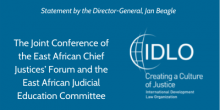Burundi is a densely populated, land locked country in Central Africa, and one of the world's poorest nations due to decades of civil unrest, and political and economic instability. The majority of the Burundian economy is agriculture (45% of the GDP) which supports 90% of the labor force. However, in recent years the country has experienced a drastic contraction of its subsistence economy due to civil war and degradation of land through over population and use, therefore continuing the nation’s heavy reliance on bilateral and multilateral aid.
As the country has moved from war to peace in relatively recent times, it faces complex issues including national and local levels of governance and legislation requiring drastic reform and improvement to strengthen the rights and livelihoods of Burundian citizens – especially women. The large number of displaced peoples within the country, and the mass migration of the population through civil war (much of which is now returning) has produced land ownership disputes and conflict.
IDLO, in partnership with the funding organization Stichting ZOA, commenced a research project in June 2015 to determine the impact of Land Tenure Registration on land disputes and women’s land rights.



